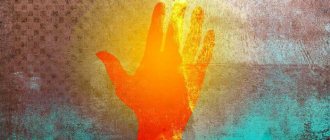- Essays
- 9th grade
/
Choosing between good and evil in our lives is always very difficult, because it is impossible to predict what this choice will ultimately lead to. Maybe everything will be fine and our wishes will come true, but it may also happen that our choice, on the contrary, can ruin everything that has ever happened. To prevent this from happening, you need to choose not only with the help of your mind, but also with your feelings and emotions.
A moral choice is a choice not only of the head, but also of the heart. If a person first of all thinks about conscience and honor, then he will most likely be able to make the right choice, which will only lead to the best decision.
This choice does not have to be large-scale or important; ordinary little things also belong to conscience. This includes responding with help to an old man’s request or passing by, taking someone else’s wallet or finding its owner, deceiving a loved one or telling the bitter but truth. All these are small everyday problems, but even they are strongly connected with our conscience.
Of course, there is a great temptation to go against your conscience to make your loved one feel good. This includes taking the money you find, lying to your parents so they don’t scold you, or passing by when bullies insult your classmate. Yes, following these temptations, at first you will experience pleasure, but how many more nights will your conscience torment you?
Yes, even sometimes, it would seem, the most honest and faithful people can go against their feelings and emotions, just for the sake of profit. And this is normal, it is the essence of a person to first protect and provide for himself, and then think about others. But if you follow these primal instincts, will you be happy? Will you become richer for taking other people's things? Most likely not, because having received temporary pleasure, after that you will think for quite a long time and suffer about what you did.
A moral person who is friends with his conscience, and does not fight with it, will never feel bad or sad. This person has the best qualities that will be very useful in their life, such as: honesty, loyalty, dedication and restraint. All these traits can be acquired, but you will need to give up selfishness and selfishness, and only then will you be able to become a truly happy and honest person
It is quite difficult to become a faithful person; for this you will have to fight with yourself, with your negative character traits and primitive instincts, but if a person succeeds, he will no longer be eaten up by conscience and resentment.
Essay with examples from literature
Every day a person is faced with a choice. He chooses what to wear, what to eat, what shoes to wear, where to go and with whom, what movie to choose today. Also, moral choice is very important. A person can encounter it more than once a day. This is a choice of action in favor of good or bad. And this choice shows what kind of person he really is. Morally pure people are decent and reliable, despising lies in any form. Writers and poets all over the world have raised this topic in their works.
For example, A.S. Pushkin in the story “The Captain's Daughter” puts a choice before his heroes: show loyalty to the oath or join the impostor Emelyan Pugachev. Realizing that this promises them death, many make a choice in favor of the Motherland and loyalty to the Fatherland. The parents of Masha Mironova, Pyotr Grinev and others refuse to swear allegiance to the deceiver and understand that this will be followed by execution. This moral act can be called a feat. At this time, Shvabrin takes a different path. He, pursuing his own selfish goals and saving his life, takes Pugachev’s side.
V. Bykov in the story “Sotnikov” also described the theme of moral choice, but this time of two Russian soldiers. During the war, the characters reveal their true colors. Finding themselves in the tenacious clutches of the enemy, the behavior of Sotnikov and Rybak is radically different. Sotnikov's love and respect for his homeland does not allow him to even think about treason. He refuses to give information to his enemies, which means death. The fisherman makes a different choice in favor of betrayal. He had to renounce his homeland and take part in the execution of a comrade in arms.
In his novel “Eugene Onegin” A.S. Pushkin also talks about love, betrayal, disappointment, stupidity and mistakes. From the choice of Eugene Onegin, the life of him and Tatyana, who was not afraid to open up. The reason for the wrong choice was the hero’s excessive narcissism. He meanly and cruelly laughed at Tatyana’s feelings, which endlessly offended and humiliated her. A highly moral person would have found the right words to explain everything gently and less painfully to the young girl.
From the above it is clear that people forced to make moral choices immediately show their inner world, intentions and principles. A true hero is one who finds the strength to give up his own good in favor of others, and does not act in his own interests. We always need to act in such a way that we and our loved ones are not ashamed of our actions.
Examples and arguments from literature
Sometimes a person simply forgets about the importance of this phrase, since he has to make a choice every day. He takes moral choice for granted. At the same time, he does not think about the fact that choice can significantly affect life and destiny in general.
Arguments from the literature:
- “Eugene Onegin” by A. S. Pushkin. The main character of the novel faces a moral choice when Tatyana confesses her love to him. Not only his personal fate, but also Tatiana’s life depends on Eugene Onegin’s decision. But he makes the wrong decision, Onegin laughs at her feelings. Tatyana Larina's love is cruelly rejected, destroyed and trampled. On the one hand, Evgeniy can be supported; he does not deceive the girl, because he actually does not have ardent feelings for her. On the other hand, the hero treats her very cruelly, which Tatyana does not deserve at all. After many years, Tatyana is no longer a sweet girl, she is an attractive young lady. Evgeny Onegin falls in love with her when they meet and tells her about it. But Tatyana makes her choice not in his favor. Now it was her turn. And she is not mistaken, she is faithful to her husband, for her family is above all. Larina rejects Onegin. This is how two heroes, connected by love, were able to make two different decisions.
- “The Captain's Daughter” by A. S. Pushkin. Shvabrin has to make a difficult moral choice. When the Belgorod fortress was captured, he hesitated to continue it or to join Pugachev’s rebels. The hero chooses the second path and makes a mistake. By showing his cowardice and weakness, a person chooses his own destiny. The result is that he is a traitor to the Motherland, his reward for the wrong choice is shackles.
Two examples show that making a moral decision is not easy. But it is worth remembering that no matter what choice a person makes, society will always have its own opinion on this matter.
To write an essay or presentation in high school, you can use Ozhegov’s explanatory dictionary and comments to explain some of the qualities of a person.
To summarize, it should be said that moral choice can be expressed solely on the basis of personal qualities, outlook on life and individual moral principles of a person . Therefore, we can say that a moral decision is one of the most difficult in a person’s life.
Essay What is moral choice (15.3 OGE)
Any person, sooner or later in his life, is faced with the fact that he has to make a decision in a difficult situation that requires a moral choice. But what is a moral choice and how to make it correctly?
A moral choice is a choice based on moral standards and not contrary to generally accepted attitudes and human conscience.
A person is faced with situations requiring decision making every day of his life. However, often this choice is dictated not only by a person’s desires or external circumstances, but by the moral principles inherent in a person. People are guided by them in a variety of situations: from small everyday incidents to global ones, where people's lives can be at stake.
Let's look at an example from the literature. In the novel by A.S. Pushkin's "Eugene Onegin" such a choice faces one of the heroines, Tatyana Larina. The girl falls in love with Evgeniy, but is refused. However, after a while, she marries a general and becomes a famous person in the Moscow court. Having met her again, Evgeniy realizes that he is in love. He goes to Tatyana, already a married woman, and opens up about his feelings. The girl faces a difficult choice: she still loves Eugene, who is now in love with her too, but now she belongs to another person. Tatyana replies that she will remain forever faithful to her husband. She oversteps her feelings for the sake of moral duty and respect for her husband. It was her moral choice, and the girl was able to make it correctly.
Let's look at an example from life. I recently watched a film about the war, “I Will Remember.” During the war, as we know, there was a genocide of Jews who were caught on the streets and killed. The family of the main character, the boy Vadka, shelters a Jewish boy in their house. Periodically, the police check their house, but the residents of the house, risking their own lives, hide Jews, although they face charges of harboring. Vadka’s father is even involved in illegally smuggling Jews across the border, risking his own life. During one of these operations he dies. Vadka himself, even as a thirteen-year-old teenager, puts his own life on the line, helping the boy who lived in their house. The choice of the heroes of this film is really difficult - after all, it is their own life against someone else’s life, but even the war does not make them cowardly, and they remain true to their moral duty.
Thus, any situation may require a person to make a moral choice. It is rarely easy, and therefore it is very important not to be led by your fears and desires in order to do it correctly.
Text for essay 9.3 “What is MORAL CHOICE?”
(1) This torment began long ago, in fifth or sixth grade.
(2) Glebov lived in his two-story courtyard next to a gray, huge, like a whole city or even a whole country, house with a thousand windows. (3) A gray bulk hung over the alley, in the mornings it blocked out the sun, and in the evenings the sounds of music flew from above. (4) There, on the celestial floors, life seemed to be going on completely different from that below. (5) And from an early age Glebov had a burning sensation in his soul: either envy or something else.
(6) Glebov’s mother worked as an usher in a cinema. (7) And so her service in the cinema - a seedy one, in one of the Zamoskvoretsky alleys - was a source of considerable pride for Glebov and distinguished him with the greatest privilege: he could go to any film without a ticket. (8) And sometimes in the daytime, when there are few spectators, he could even lead a comrade, or even two.
(9) This privilege was the basis of Glebov’s power in the class. (10) He used it prudently and intelligently: he invited boys whose friendship he was interested in, from whom he expected something in return, he fed others with promises for a long time before he showed a benefit, and he forever deprived some scoundrels of his favor. (11) Gleb’s power continued – well, not power, but, let’s say, authority – and remained unshaken until Levka Shulepa arose.
(12) The first days he behaved arrogantly, looked at everyone with his blue eyes sleepily and contemptuously, did not start a conversation with anyone and sat down at the same desk with the girl. (13) They decided to teach him a lesson, or rather, humiliate him. (14) Or more precisely, to disgrace. (15) Glebov hotly tried to persuade him to deal with Shulepa, whom he did not like, but at the last moment he decided not to participate in the violence.
(16) The boys - there were about five of them - called Lyovka into the backyard after school, surrounded him, argued about something, and suddenly Bear, the main strongman of the class, grabbed Lyovka by the neck, knocked him over with a jerk, the rest shouted “Whoa!” go! They attacked, Lyovka resisted, kicked him, but, of course, he was crushed, twisted, and someone sat on his chest.
(17) And suddenly there was a loud crash, as if a firecracker had exploded or a car tire had burst. (18) Then all five rushed to the sides, Lyovka rose to his feet, and in his hand he held a scarecrow, which fired special percussion caps. (19) Shulepa emerged victorious from this story, and the attackers were put to shame and subsequently tried in every possible way to make peace and make friends with him.
(20) So Lyovka, from a man who was going to be disgraced throughout the world, turned into a hero. (21) And from this time, probably, that heaviness at the bottom of Glebov’s soul arose... (22) And there are no more unhappy people who are stricken with envy. (23) And there was no more crushing misfortune than what happened to Glebov at the moment of his seemingly supreme triumph. (According to Yu. Trifonov)* * Yuri Valentinovich Trifonov (1925–1981) - Russian Soviet writer, master of “urban” prose.
Reasoning
A person is a unique person who is surrounded on all sides by a large number of needs and things necessary for his life, and the person is also subject to both the physical and social requirements of the nation where he lives, its requirements, rules and norms, principles of behavior and mentality of a given society, rituals, traditional actions, and a person cannot neglect the needs and necessities of the economic plan. And from here follows the following question: is a person really free in his actions, in his moral choice?
Moral choice is a necessary component of the condition, obligatory in order to realize human needs. The problems that exist in moral choice provide a unique opportunity to open up morality in detail, to look at it from the perspective of principles, moral orientations and values of a person, norms raging in society, in interpersonal relationships.
Moral choice is a necessary component even in situations where a person has circumstances that force him to make only one choice (decision), while having several options. Each choice is assessed from both a position of good and evil. In addition, it is necessary to look at the objective and subjective factors that influence the situation of choice, but the decision that a person has made cannot complete the entire selection process
Generally speaking about the moral choice of a person who faces him, it is necessary to note the goals that are used by the individual. The range of goals that determine a person’s choice and its content is very wide and unique.
It is worth saying that each person almost always makes his own choice. So, it should be noted that a person chooses a goal himself; this cannot be done for him. The goal proposed by another person can be considered correct and harmonious only if the person who makes the choice agrees not only superficially, but also internally with the proposed solution to the choice, the moral choice.
Also, fatal consequences include such a personality trait as refusal of determination, when a person has a fear of making a mistake, but it is worth considering that refusal to choose is a form of such a choice, which is not the best.
As for motivation, it is the basis of moral choice, it determines the essence of the goal, whether a person is motivated towards good or evil, which is more inherent to her and which more describes her internal picture. So, motivation determines goals, and hence the ways to achieve it.
In a person's ability to choose, there is a wide range of choices, both between good and evil. And the very definition of a person’s moral values, why she prefers, what she is interested in and how she lives.
When a person makes his moral choice, he consciously or unconsciously gives preference to certain types of behavior; here he is guided by his own (that is, personal) ideas about values in the field of morality.
A person may experience a number of different situations throughout his life. In these situations, both the moral environment of the individual and the person’s own personality are formed. Also, when talking about moral choice, it is worth noting that each person determines his own priorities based on the same value. Some people choose one thing, while others prefer another. For some, one value prevails over another, and for others, it’s the other way around.
When making a moral choice, one should not forget about such diversity: norms and stereotypes (principles), customs, rituals and a variety of traditions that influence an individual’s choice every day. Also, the moral norm is manifested in tolerance, politeness, respect for elders, and the like.
A person can also exercise moral choices in his thoughts, that is, fantasize about them, dream about heroic concessions, about doing something good for others and for himself. But we should not forget that a choice (especially a moral one, made for the benefit of society) will be considered valid and successful only if it was explicit, only when it can be assessed and seen.
A moral act profoundly influences the moral choices not only of the person who committed it, but also the moral choices of other people. It may change another person's life very little, or radically, or it may not even change the other person (perhaps due to excessive indifference or dishonesty, that is, lack of it). The influence of a moral act can fluctuate in a very unpredictable and colossal way.
In conclusion, I would like to say that each person (person) interprets moral choice in their own way. For someone, for example, giving up their seat on public transport is a common thing, but for another it will look like a whole feat, he will do a great job, this person is real, conscientious, highly moral. Therefore, draw your own conclusions and always think about your actions. I wish you not to make mistakes in making your moral choice!!!
Other topics: ← What is friendship?↑ Grade 9 Moral →
`
Popular writings
- The meaning of human life - essay reasoning
Little children always wake up in the morning and rejoice at everything that happens, for no particular reason. Of course, none of them would refuse a large number of toys and sweets. - How I clean an apartment or room essay
There are few people who love to clean. I am one of those people. I tidy up the room once a week. - Essay Honor and duty in the novel The Captain's Daughter by Pushkin
One of the main problems of the novel by A. S. Pushkin “The Captain's Daughter” is the issue of honor and duty. Throughout the work, the author follows the fate of the heroes who find themselves in a situation of moral choice.







